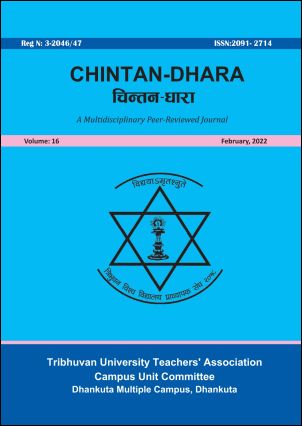मानव महाकाव्यमा संवृत्ति वक्रता {Pronominal Implicature (Samvriti vakrata) in Human(Manav) epic}
DOI:
https://doi.org/10.3126/cd.v16i1.48167Keywords:
संवृत्ति वक्रता, अनिर्वचनीय वस्तु, अवणर्नीय वस्तु, सर्वनामादि, संवरण कला, pronominal implicature, inexpressible things, indescribable things, pronoun and like, reservation skillAbstract
यस लेखमा मोदनाथ प्रश्रितद्वारा रचना गरिएको मानव महाकाव्यमा संवृत्ति वक्रताको प्रयोगको अवस्था के कस्तो छ भन्ने समस्याको समाधानार्थ उक्त काव्यमा प्रयुक्त संवृत्ति वक्रताको निरूपण गर्ने उद्देश्य राखिएको छ । संवृत्ति वक्रता पूर्वीय आचार्य राजानक कुन्तकले प्रतिपादन गरेको वक्रोक्ति सिद्धान्तका छवटा स्थूल प्रकारमध्येको एउटा प्रकार{ पदपुर्बाध्द वक्रताको भेद हो । खास भावलाई सर्वनामादिको प्रयोगद्वारा गोपन गरी अभिव्यक्तिलाई वैचित्र्यमय बनाइएमा यस प्रकारको वक्रता उत्पन्न हुन्छ । यस वक्रताका वणर्नसम्भव वस्तुको संवरण, अनिर्वचनीय वस्तुको संवरण, अवणर्नीय वस्तुको संवरण, अनुभवसंवेद्य वस्तुको संवरण, परानुभव वस्तुको संंवरण र वणर्नअयुक्त वस्तुको संवरण गरी छवटा भेदहरू छन् । यी छवटै भेदहरूलाई आधार मानी संवृत्ति वक्रताको सिद्धान्तानुकूलका प्रयोगहरूलाई तथ्यका रूपमा उपयोग गरी यहाँ तिनको विश्लेषण गरिएको छ । गुणात्मक ढाँचामा आधारित यस लेखमा निगमनात्मक विधिको उपयोग गरिएको छ । यस काव्यमा संवृत्ति वक्रताका उक्त सबै भेदहरूको प्रयोग प्रशस्त पाइएकाले यो काव्य यस प्रकारको वक्रता प्रयोगका दृष्टिले समृद्ध बनेको छ भन्ने निष्कर्ष यहाँ निकालिएको छ ।
In this article, it is intended to describe the use of pronominal implicature (samvriti vakrata) in the epic 'Human' (Manav) composed by Modnath Prasrit, in order to solve the problem of what is the condition of the use of pronominal implicature in the epic. Pronominal implicature, one of the six gross types of implicature theory (Vakrokti Siddhanta) propounded by the Eastern scholar (Acharya) Rajanak Kuntak, is a variation of 'Padapurvardhda Vakrata'. This kind of implicature (Vakrata) occurs when the expression is obscured by the use of pronouns to make the expression strange. There are six variations of this implicature: the reservation of describable things (varnansambhav vastu), the reservation of inexpressible things (anirvachaniya vastu), the reservation of indescribable things (avarnaniya vastu), the reservation of perceptible things (anuvavsamvedya vastu), the reservation of out-perceptible things (paranuvav vastu) and the reservation of inexplicable things (varnanayukta vastu). Taking these six distinctions as a basis, these have been analyzed here using the theoretical applications of pronominal implicature as facts. Inductive method has been used in this article based on qualitative framework. In this poem, the use of all the variations of pronominal implicature are abundantly found, so it is concluded that this poem is rich in terms of the use of this type of implicature.




